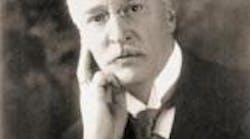I’ve come to believe the saying, “what goes around, comes around,” is famous because it’s true. Fashion comes and goes, but every 20 years or so, we see the same trends reborn. Classic television shows are “updated” for future generations, or made into movies, many times not as good (see Starsky & Hutch).
But biodiesel? Yes, it’s true. Biodiesel actually can trace its roots back to the late 1800s.
In celebration of National Biodiesel Day, which took place on March 18 - not-so-coincidentally on the birthday of one Rudolf Diesel - the National Biodiesel Board posted an article detailing Diesel’s contributions to biodiesel.
It seems that in Diesel’s first designs of the engine, he used peanut oil. It wasn’t until later that a petroleum-based fuel source was incorporated. But Diesel was prophetic in saying, in a 1912 speech, that “the use of vegetable oils for engine fuels may seem insignificant today, but such oils may become, in the course of time, as important as petroleum and the coal tar products of the present day.”
What Diesel didn’t know is that some 98 years later, we’d still be struggling with how best to fully incorporate vegetable oils and other alternative-fuel sources into our daily lives. The technology is there, albeit expensive in many cases. But just as importantly is the question of how to truly harness its power to make a widespread impact?
The ideas of men like Diesel are often overlooked (although the engine itself received its due) at the time, dismissed either as crackpots or someone whose ideas are not in-tune with reality. There are likely many people like that even today.
Perhaps, someday, we’ll learn to listen, because it’s quite possible the answers to solving dependence on foreign oil were born a hundred years ago.




